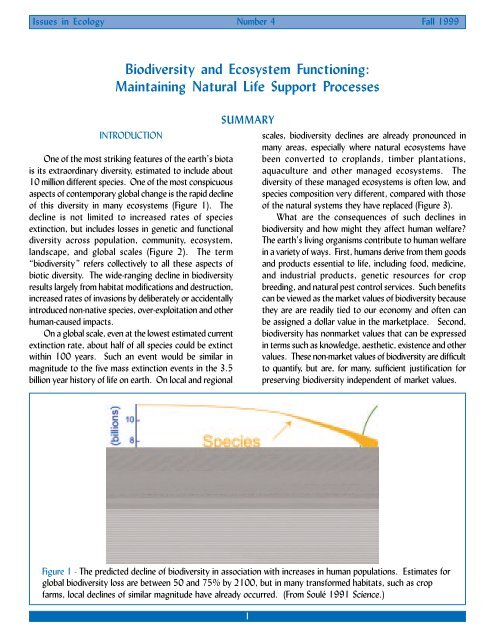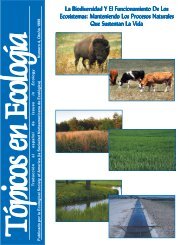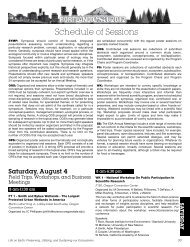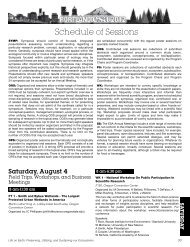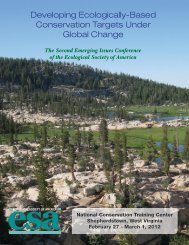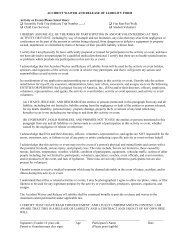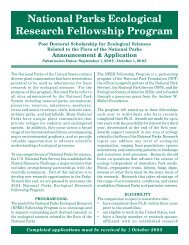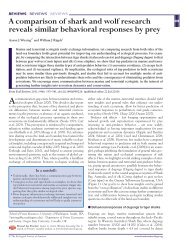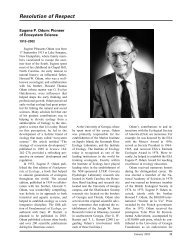Biodiversity and Ecosystem Functioning - Ecological Society of ...
Biodiversity and Ecosystem Functioning - Ecological Society of ...
Biodiversity and Ecosystem Functioning - Ecological Society of ...
Create successful ePaper yourself
Turn your PDF publications into a flip-book with our unique Google optimized e-Paper software.
Issues in Ecology Number 4 Fall 1999<br />
<strong>Biodiversity</strong> <strong>and</strong> <strong>Ecosystem</strong> <strong>Functioning</strong>:<br />
Maintaining Natural Life Support Processes<br />
INTRODUCTION<br />
One <strong>of</strong> the most striking features <strong>of</strong> the earth’s biota<br />
is its extraordinary diversity, estimated to include about<br />
10 million different species. One <strong>of</strong> the most conspicuous<br />
aspects <strong>of</strong> contemporary global change is the rapid decline<br />
<strong>of</strong> this diversity in many ecosystems (Figure 1). The<br />
decline is not limited to increased rates <strong>of</strong> species<br />
extinction, but includes losses in genetic <strong>and</strong> functional<br />
diversity across population, community, ecosystem,<br />
l<strong>and</strong>scape, <strong>and</strong> global scales (Figure 2). The term<br />
“biodiversity” refers collectively to all these aspects <strong>of</strong><br />
biotic diversity. The wide-ranging decline in biodiversity<br />
results largely from habitat modifications <strong>and</strong> destruction,<br />
increased rates <strong>of</strong> invasions by deliberately or accidentally<br />
introduced non-native species, over-exploitation <strong>and</strong> other<br />
human-caused impacts.<br />
On a global scale, even at the lowest estimated current<br />
extinction rate, about half <strong>of</strong> all species could be extinct<br />
within 100 years. Such an event would be similar in<br />
magnitude to the five mass extinction events in the 3.5<br />
billion year history <strong>of</strong> life on earth. On local <strong>and</strong> regional<br />
SUMMARY<br />
1<br />
scales, biodiversity declines are already pronounced in<br />
many areas, especially where natural ecosystems have<br />
been converted to cropl<strong>and</strong>s, timber plantations,<br />
aquaculture <strong>and</strong> other managed ecosystems. The<br />
diversity <strong>of</strong> these managed ecosystems is <strong>of</strong>ten low, <strong>and</strong><br />
species composition very different, compared with those<br />
<strong>of</strong> the natural systems they have replaced (Figure 3).<br />
What are the consequences <strong>of</strong> such declines in<br />
biodiversity <strong>and</strong> how might they affect human welfare?<br />
The earth’s living organisms contribute to human welfare<br />
in a variety <strong>of</strong> ways. First, humans derive from them goods<br />
<strong>and</strong> products essential to life, including food, medicine,<br />
<strong>and</strong> industrial products, genetic resources for crop<br />
breeding, <strong>and</strong> natural pest control services. Such benefits<br />
can be viewed as the market values <strong>of</strong> biodiversity because<br />
they are are readily tied to our economy <strong>and</strong> <strong>of</strong>ten can<br />
be assigned a dollar value in the marketplace. Second,<br />
biodiversity has nonmarket values that can be expressed<br />
in terms such as knowledge, aesthetic, existence <strong>and</strong> other<br />
values. These non-market values <strong>of</strong> biodiversity are difficult<br />
to quantify, but are, for many, sufficient justification for<br />
preserving biodiversity independent <strong>of</strong> market values.<br />
Figure 1 - The predicted decline <strong>of</strong> biodiversity in association with increases in human populations. Estimates for<br />
global biodiversity loss are between 50 <strong>and</strong> 75% by 2100, but in many transformed habitats, such as crop<br />
farms, local declines <strong>of</strong> similar magnitude have already occurred. (From Soulé 1991 Science.)


